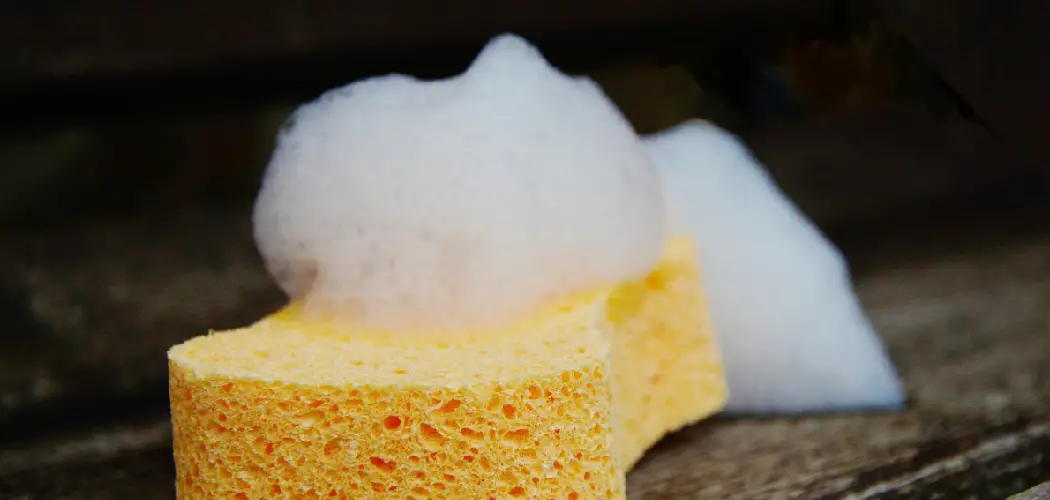Are you stuck with unsightly foam in your pool and need help figuring out what to do? Are you struggling to get that ugly foam out of your pool?
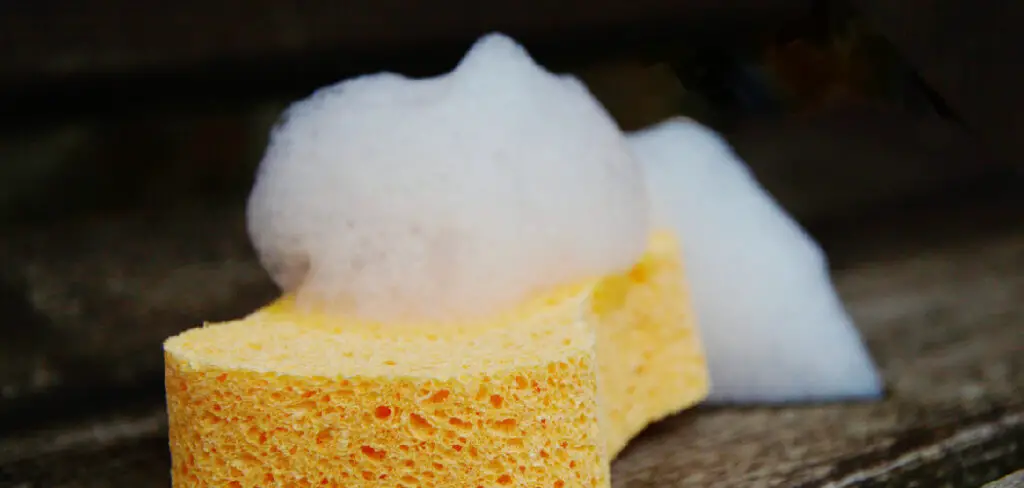
Are you annoyed at how much time and energy it’s taking to try and attempt the task? If so, don’t worry! There’s an easy, effective way to get it out without closing the pool. While chemical imbalances or contaminants may often create a foamy surface in swimming pools, there are steps you can take to safely remove it and ensure that your pool remains safe for everyone.
In this post, we’ll share our tried-and-tested methods for banishing foam from your swimming area. From using chemical balancing techniques to understanding why specific solutions do better than others, there’s critical information here that can help tackle a perennial problem: foamy pools. Read on for tips on how to get foam out of pool quickly and easily!
Necessary Items
Before you begin, it’s essential to gather all the necessary items to tackle this task properly. You will need:
- A pool skimmer or net
- Pool vacuum (optional)
- Water chemistry test kit
- Algaecide (if required)
- Anti-foam solution or defoamer
10 Steps on How to Get Foam Out of Pool
Step 1: Skim the Surface
Start by skimming the surface of your pool with a skimmer or net to remove any debris, such as leaves and bugs, on the surface. This will help prevent further foaming.
Step 2: Check Water Chemistry
Next, use a water chemistry test kit to check the levels of your pool’s chemicals. High pH levels or an imbalance in calcium hardness can often cause foaming. Adjust these levels accordingly with the appropriate chemicals.
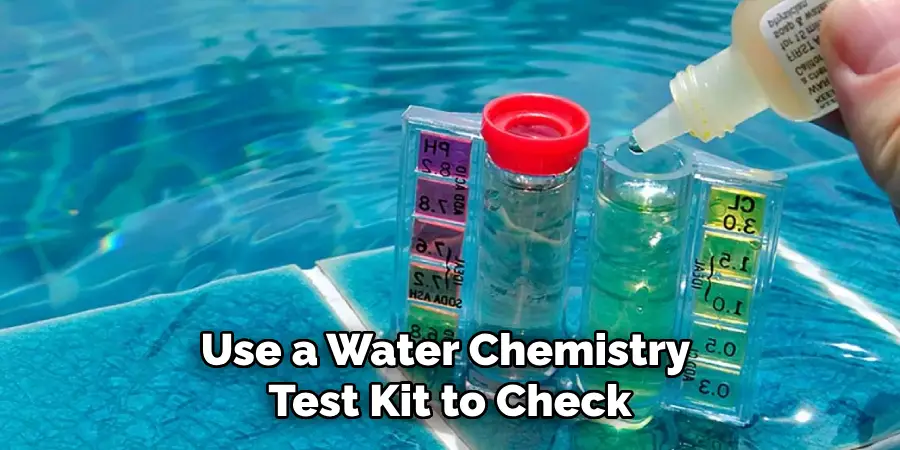
Step 3: Shock Your Pool
If your pool has high chlorine or algae levels, it may be necessary to shock your pool. This will kill any bacteria or algae contributing to the foam. Follow the instructions on the shock product carefully.
Step 4: Use Algaecide
If your pool has algae, use an algaecide according to package instructions to effectively get rid of it. This can help alleviate foam as well.
Step 5: Add Anti-Foam Solution or Defoamer
If the foam persists, it may be necessary to add an anti-foam solution or defoamer. These products help break up the foam by reducing surface tension.
Step 6: Let it Sit
After adding the anti-foam solution or defoamer, let it sit for about 15 minutes to allow it time to work. This will give it enough time to break up the foam.
Step 7: Skim Again
After the solution has had time to work, skim the surface of your pool once again to remove any remaining debris or foam particles.
Step 8: Use a Pool Vacuum (Optional)
If your pool has foam in the water, you may need to use a pool vacuum instead of skimming and using chemical solutions. This will help remove any foam particles that have sunk to the bottom of the pool.
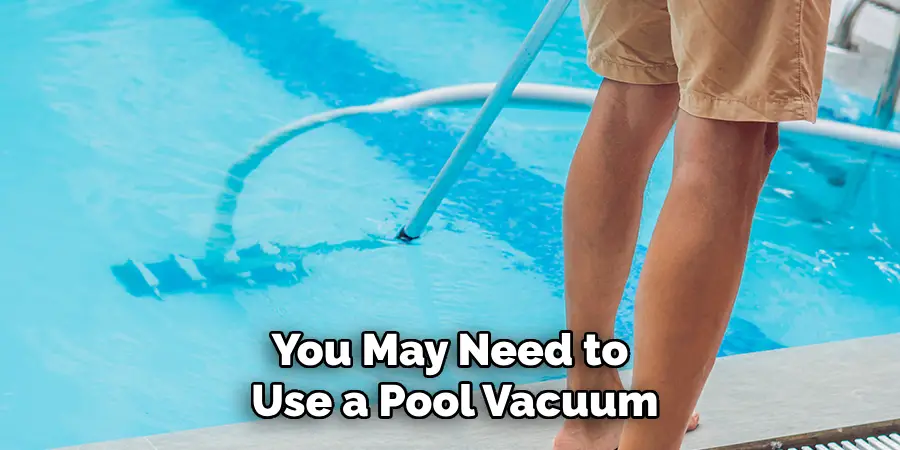
Step 9: Retest Water Chemistry
After completing these steps, retest your pool’s water chemistry to ensure the levels are balanced. Adjust as needed.
Step 10: Prevention Measures
To prevent foam from occurring in the future, make sure to clean and maintain your pool regularly. Skim the surface periodically and test the water chemistry at least once a week. This will help keep your pool safe and free of foam.
Foam in your pool can be frustrating and time-consuming, but with the right tools and techniques, it can easily be removed. By regularly maintaining your pool’s water chemistry and skimming the surface, you can prevent foam from occurring in the first place.
If it does happen, follow these steps to quickly remove it and restore your pool to a clean and safe state. Say goodbye to foam and hello to crystal-clear water! So, with these easy steps and simple solutions, you can easily remove foam from your pool and return to enjoying your swimming area in no time. Remember to always stay on top of maintenance and chemical levels for a sparkling clean pool all year round.
8 Care Tips to Maintain Your Pool’s Cleanliness
1. Regularly Skim and Vacuum
As mentioned earlier, regular skimming and vacuuming is crucial in maintaining a clean pool. By removing leaves, debris, and other particles on the surface of your pool, you can prevent them from sinking to the bottom and creating more work for you.
2. Brush the Walls and Floor of the Pool
In addition to skimming and vacuuming, it’s essential to brush the walls and floor of your pool regularly. This will help loosen any stubborn dirt or algae sticking to the surface.
3. Keep Chemical Levels Balanced
Properly balancing your pool’s chemical levels is essential in maintaining clean and safe water. Regularly test and adjust pH, chlorine, alkaline, and calcium levels.
4. Shock Your Pool
In addition to regular chemical maintenance, it’s important to shock your pool every few weeks. This helps eliminate bacteria, algae, and other organic matter that may be difficult to remove with regular treatments.
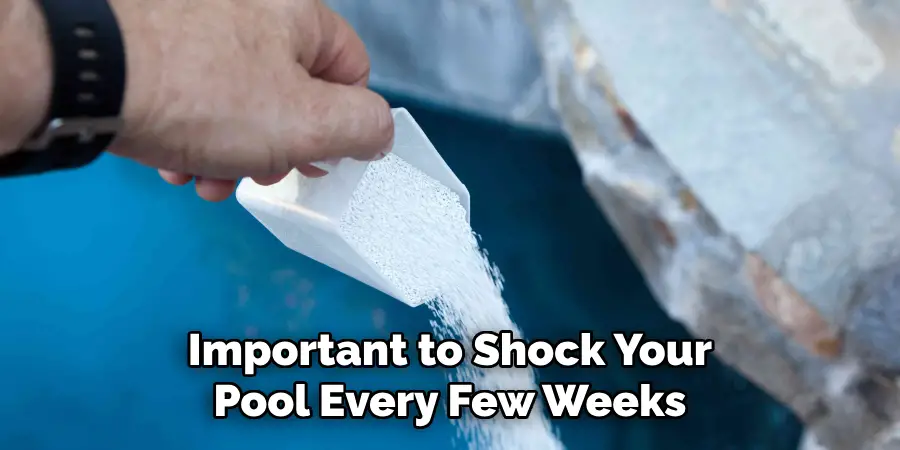
5. Clean Your Filter
Regularly cleaning your pool filter is crucial in keeping your water clean. Follow the manufacturer’s instructions and clean or replace your filter as needed.
6. Keep Your Surrounding Area Clean
Keep the area around your pool clean to prevent debris from falling into the water. This includes regularly sweeping or blowing away leaves, dirt, and debris on your deck or patio.
7. Use a Pool Cover
When your pool is not in use, cover it with a pool cover to prevent leaves and other debris from entering the water. This can significantly reduce the time and effort needed to clean your pool.
8. Regular Maintenance Checks
Regularly check your pool’s equipment, such as pumps, filters, and skimmers, for any issues or malfunctions. Addressing these problems promptly can prevent more significant issues and keep your pool running smoothly.
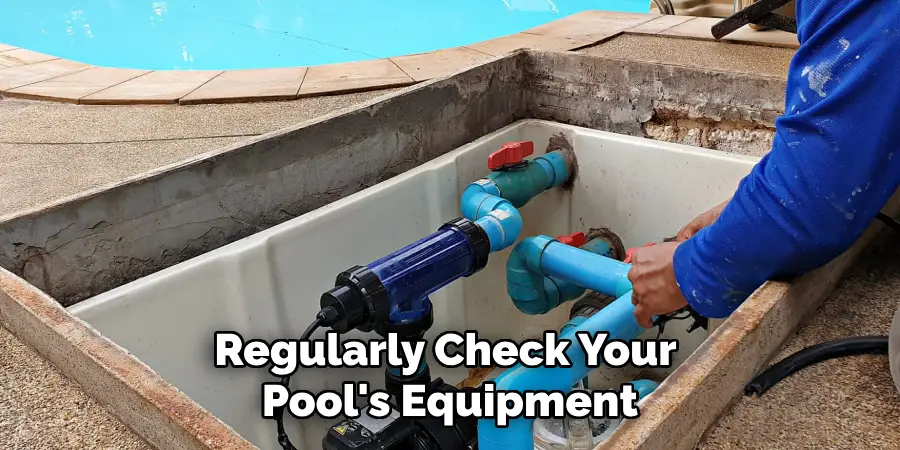
With these eight care tips on how to get foam out of pool, you can maintain a clean and pristine pool all year round. By regularly attending to your pool’s maintenance needs, you can prevent common issues like sand build-up and ensure that your pool is always ready for a swim. So don’t neglect your pool’s cleanliness – follow these tips and enjoy a sparkling pool all season long! So give your pool the care it deserves, and you’ll be rewarded with clean and refreshing water for years.
Frequently Asked Questions
Can I Use Regular Household Cleaners to Clean My Pool?
No, it is essential only to use products specifically designed for pool cleaning. Regular household cleaners can alter the chemical balance of your pool water and may cause damage to your pool’s surface.
How Often Should I Shock My Pool?
It is recommended to shock your pool every 1-2 weeks, depending on usage and weather conditions. However, it’s always best to follow the manufacturer’s instructions for your specific type of pool shock.
Can I Add Too Much Chemicals To My Pool?
Yes, adding too many chemicals can cause imbalances in your pool’s water chemistry and potentially harm swimmer’s skin and eyes. Always carefully follow the recommended dosage for your pool’s size and type.
How Often Should I Clean My Pool?
It is recommended to clean your pool at least once a week. However, if you notice excessive debris or changes in water clarity, it may be necessary to clean more frequently.
Can I Leave My Pool Cover on for Extended Periods of Time?
It is not recommended to leave your pool cover on for extended periods. This can trap debris and create an ideal breeding ground for bacteria and algae.
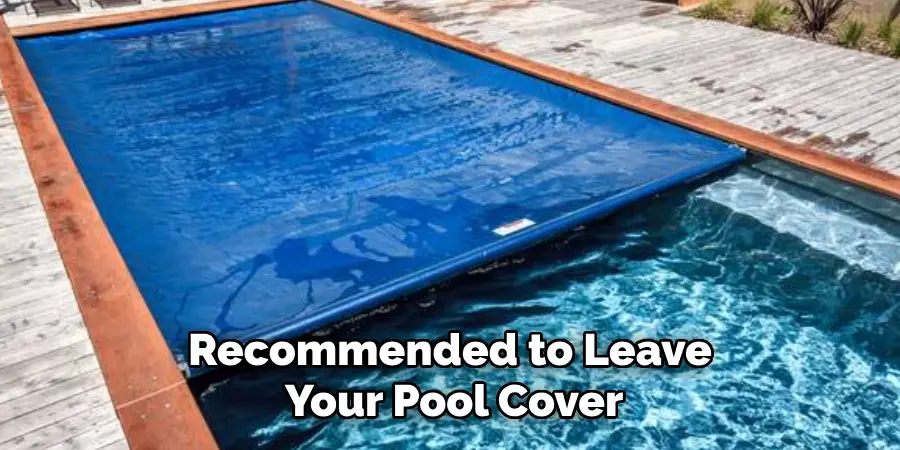
Should I Hire a Professional to Clean My Pool?
If you are unsure or uncomfortable with cleaning your pool, it may be best to hire a professional pool cleaning service. They have the expertise and equipment to clean and maintain your pool correctly.
However, with proper knowledge and maintenance, you can save money by cleaning your pool.
Research and follow the proper guidelines to ensure your pool remains in top condition. So, whether you hire a professional or clean your pool yourself, regular maintenance is vital in keeping your pool clean and ready for use. Now, go out and enjoy that crystal-clear water!
Conclusion
Regular maintenance is crucial in keeping your pool clean and safe for use. By following these care tips on how to get foam out of pool and frequently checking and balancing chemical levels, you can prevent common issues like foam from occurring. Remember always to use proper cleaning products and follow instructions carefully.
And if in doubt, consult a professional pool cleaner for assistance. Happy swimming! So, now that you have all the tools and knowledge to maintain a clean pool, go out and enjoy your swimming area without any worries. Remember, a little effort goes a long way in keeping your pool sparkling and inviting all year round. So take care of your pool, and it will take care of you!
About
Outdoor Fixes is a distinguished figure in the world of Diy design, with a decade of expertise creating innovative and sustainable Diy solutions.
His professional focus lies in merging traditional craftsmanship with modern manufacturing techniques,
fostering designs that are both practical and environmentally conscious. As the author of diy,
outdoorfixes delves into the art and science of outdoorfixes-making, inspiring artisans and industry professionals alike.
Education RMIT University
(Melbourne, Australia) Associate Degree in Design (Outdoor Fixes) Focus on sustainable design, industry-driven projects,
and practical craftsmanship. Gained hands-on experience with traditional and digital manufacturing tools, such as CAD and CNC software.
Nottingham Trent University
(United Kingdom) Bachelor’s in outdoorfixes.com and Product Design (Honors) Specialized in product design with a focus on blending creativity with production
techniques. Participated in industry projects, working with companies like John Lewis and Vitsoe to gain real-world insights.
Publications and Impact
In diy, Outdoor Fixes his insights on indoor design processes, materials, and strategies for efficient production.
His writing bridges the gap between artisan knowledge and modern industry needs, making it a must-read for both budding designers and seasoned professionals.

